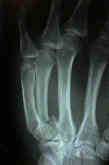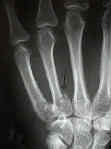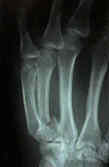- Discussion:
- interosseous muscles & intrinsically strong carpometacarpal capsular and interosseous ligaments provide intrinsic stability to extra-articular fractures at the metacarpal bases;
- mechanism of frx of little CMC:
- stability of CMC joint derives from articulation w/ carpal bones,
- convex bases metacarpals are displaced dorsally losing stability of articulation and causing extrinsic tendon power to be unbalanced;
- ECU is a deforming force since it inserts onto base of 5th metacarpal;
- overpull of ECU along w/ interposition of capsule may complicate reduction;
- most common presentation is the dorsal avulsion frx of metacarpal base;
- associated frx: CMC joints dislocation is associated w/ this injury;
- X-Rays:
- isolated metacarpal views are not possible;
- 30 deg pronated lateral: for index and long metacarpals;
- 30 supinated lateral: for ring and little metacarpals;
- Non operative treatment:
- extra-articular fractrues may be impacted and clinically stable when they occur from direct trauma;
- these may be treated w/ splints;
- Operative treatment:
- unstable fractures may result from violent trauma and may require & internal fixation w/ K wires;
- more stable fixation can be gained w/ 2.0 mm or 2.7 mm condylar plate;
- note associatted soft tissue injuries, may preclude plate fixation




Clinical results of intraarticular fractures of the base of the fifth metacarpal treated by closed reduction and cast immobilization.
Intra-articular fractures at the base of the fifth metacarpal. A clinical and radiographical study of 64 cases.
The surgical treatment of fractures of the base of the fifth metacarpal bone
Management of Intra-Articular Metacarpal Base Fractures of the Second Through Fifth Metacarpals
Fracture-subluxation of base of fifth metacarpal
The ‘mirrored’ Bennett fracture of the base of the fifth metacarpal

